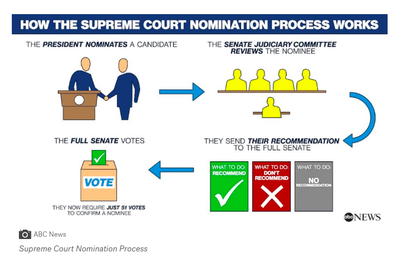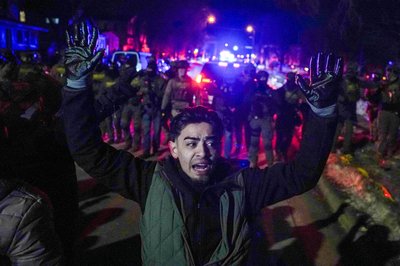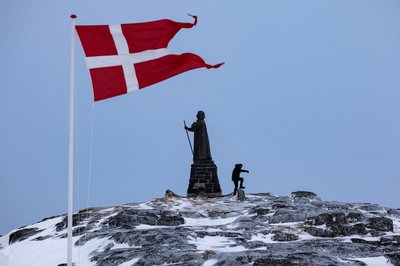Summary
Supreme Court nominee Ketanji Brown Jackson spent hours on defending her representation of Guantanamo Bay detainees and denying she'd been too lenient in child pornography cases. Saikrishna Prakash, a University of Virginia law professor and former clerk to Justice Clarence Thomas, and Margaret Russell, a law professor at Santa Clara University, join Judy Woodruff to discuss the hearing.Five Facts
- Who is Judge Ketanji Brown Jackson?
- What are the steps involved in the nomination process for a Supreme Court justice? (see the chart below)
- When and Where is Brown Jackson's Supreme Court hearing taking place?
- Why is there such a split in the types of questions Republican senators and Democratic senators ask Brown Jackson?
- How do you think the Senate will vote on Brown Jackson's nomination?

Focus Questions
So far — and this is day two — I actually think back to what I know about Thurgood Marshall's nomination hearing, which was in 1967. And when I read some of the transcript of that, I thought, oh, times have changed, because, back then, the Southern Democrats, or Dixiecrats, would just openly ask questions like, are you prejudiced against white people? What are you going to do about the rate of crime? And these were very explicitly racialized questions. So I think what surprised me, compared to them is, here they are again in a different form, Critical Race Theory. Can we trust you to like white people?
For More
- Watch the following video which provides background on Judge Ketanji Brown Jackson and how she could reshape the nation's highest court. President Biden's nomination of Brown Jackson to the U.S. Supreme Court is a landmark moment for Black women across the legal field, who throughout American history have made up less than 2 percent of the federal bench. Transcript here.
For African American women in the legal profession, it has been a long uphill battle. That is also true of other groups. But the significance of Judge Jackson's ascendancy to a court that, when it first sat in 1790, had all white men, of course, six white men, and did not have a Black member of the court until the 1960s and a female member of the court until the 1980s, should really be cause for reflection, not just sort of a recitative regurgitation of facts. But what it means is that there is a history of exclusion in the legal profession and a history of exclusion among people who actually decide the fate of millions and millions of Americans, including African Americans.
Fill out this form to share your thoughts on Classroom’s resources. Sign up for NewsHour Classroom’s ready-to-go Daily News Lessons delivered to your inbox each morning.





